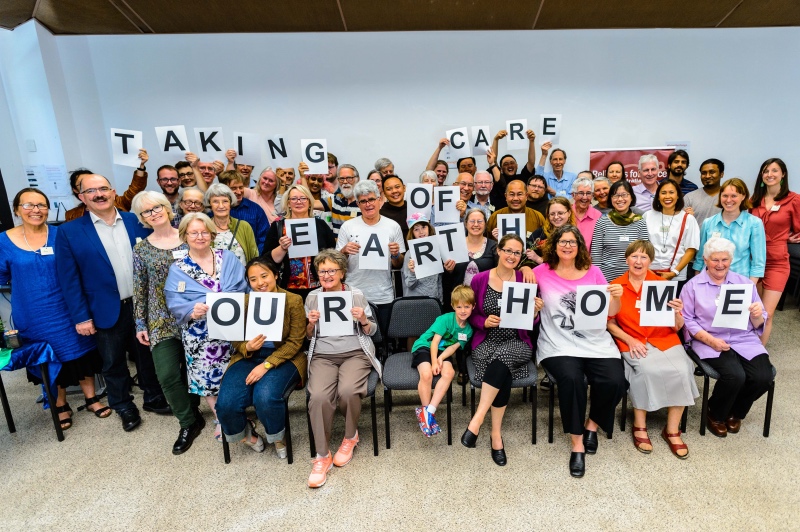
THEA ORMEROD, president of the Australian Religious Response to Climate Change, looks at how Christians should respond to the latest report from the Intergovernmental Panel on Climate Change…
The recent release of the IPCC Special Report on Global Warming of 1.5°C shows how the world is lagging dangerously far behind the targets needed to avoid catastrophic levels of climate disruption. The super-storms being experienced today, the droughts, bushfires, bleaching of coral reefs, food insecurity and sea level rise are set to worsen, even if we are able to limit warming to 1.5 degrees Celsius. The world is presently on track for around three degrees Celsius of warming, a level that would put the very future of civilisation in jeopardy.
Limiting warming to 1.5 degrees will require the very rapid decarbonisation of the global economy. For Australia, this means no new coal, a shift to 100 per cent renewable energy as soon as possible, and reaching zero emissions well before mid-century. Every delay will cost lives and livelihoods, especially for those already in poverty.

A group attending a ‘Living the Change’ event in Melbourne. PICTURE: Julian Meehan.
“As people who love God, to be consistent we must also respect God’s Creation and not act destructively towards it. Moreover, Jesus’ call for His followers to care for those who are poor extends to those who are most directly impacted by climate disruption.”
Regrettably, Australia’s emissions are continuing to rise and our Government has no plan to help tackle the climate crisis.
How are we, as Christians to respond?
As people who love God, to be consistent we must also respect God’s Creation and not act destructively towards it. Moreover, Jesus’ call for His followers to care for those who are poor extends to those who are most directly impacted by climate disruption.
As Rev Dr Peter Catt, Anglican Dean of Brisbane said, “Care for creation in all its forms is a moral action, a moral imperative. As our world changes, the most vulnerable among us are bearing the greatest cost of the impacts of climate change.”
Thus, Anglicans, Catholics, Evangelical Christians and people of a range of other religious traditions are embracing the global campaign, ‘Living the Change: faithful choices for flourishing world’. The campaign challenges believers in various spiritual traditions to make concrete commitments to living more simply, in line with their deeply held beliefs and values.
Jesus Himself was born in a stable, had nowhere to lay His head and relied on the hospitality of others to carry out His mission. Jesus called on His followers to lay up treasure for themselves in heaven, not on earth (Matthew 6:19-21), and to give to the poor and hungry (Luke 3:11).
Rev John Buchanan, minister for North Sydney’s Presbyterian parish, said, “The IPCC report tells us that technological advances and shifting economic levers are not making all the difference that is needed. Perhaps it’s time to promote lifestyle change as another valid option, and the basic principles are already embedded in the world’s religions. As a Christian, I want to follow Jesus’ teachings more fully and, in doing so, I will also be living more sustainably on this finite planet.”
During the week of 7th to 14th October, faith communities celebrated a “Week of Living the Change” with eight events in Australian capital cities and regional centres, and there were 70 events globally. People who attended were encouraged to make concrete long-term commitments to low-carbon lifestyle changes in the areas of transport, home energy use and diet.
The events acknowledged the personal sacrifices needed for these pledges but were celebratory in tone, with musical performances, food, workshops and film viewings. The event in Adelaide included performances by Aboriginal dance mob, Dusty Feet.
“There are indeed sacrifices, but there are many co-benefits that come with simpler lifestyles. Just as following Jesus brings fullness of life, moving towards plant-based diets, walking and cycling bring health benefits; using public transport and reducing air travel slows down the frenetic pace of life; more energy efficiency and renewable energy means less pollution; congruence with personal values enhances self-worth.”
There are indeed sacrifices, but there are many co-benefits that come with simpler lifestyles. Just as following Jesus brings fullness of life, moving towards plant-based diets, walking and cycling bring health benefits; using public transport and reducing air travel slows down the frenetic pace of life; more energy efficiency and renewable energy means less pollution; congruence with personal values enhances self-worth.
So which changes will be of most benefit to protecting the climate? For many, the imagination seems to leap to recycling, switching off lights or replacing lights with LED’s. However, replacing incandescent bulbs with LED’s save around 470 kilograms of CO2e (carbon dioxide equivalent) in a year while a two kilowatt solar array avoids around 2,600 kilograms of CO2e. The most impactful step for the average household, however, is to switch to GreenPower, which would avoid around 5,900 kilograms of CO2e per annum.
Probably the most impactful actions an individual can take are to avoid long-haul flights (Melbourne to London return causes around 6,000 kilograms of CO2e) and do without a car (around 1,800 kilograms if CO2e). It may also surprise some readers that reducing meat consumption has significant environmental benefits. For anyone consuming around the Australian national average of meat, to halve this would bring a saving of around 470 kilograms of CO2e per annum. For more on emissions which can be avoided, see here.
We are Living the Change, and we invite all people of goodwill to join us. If anyone would like to make a commitment, please go to https://livingthechange.net/commitment-tool.
Thea Ormerod is the president of the Australian Religious Response to Climate Change.





